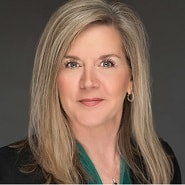
Sarah Richardson, CIO, Calif. Market, Healthcare Partners

Tressa Springmann, VP & CIO, LifeBridge Health

Julie Bonello, CIO, Rush Health
Women and men are inherently different.
Men are better negotiators, more confident, and more likely to take risks. Women, on the other hand, are better team players and are more mission-driven.
We’ve heard these sentiments so many times — and for so long — that they’ve become widely accepted as facts. The reality, according to a Harvard Business Review, is that there are differences between men and women. “But they’re not rooted in fixed gender traits,” it states. “Rather, they stem from organizational structures, company practices, and patterns of interaction that position men and women differently, creating systematically different experiences for them.”
In other words, the reason women occupy fewer leadership roles in fields like healthcare IT is more about nurture, and less about nature. It can be a very discouraging thing to hear. But it also can be inspiring, according to Women in Health IT Leadership panelists, who believe it’s time to move past the (justified) anger many women feel and work to forge change.
Recently we spoke with three influential women about the challenges they’ve faced in their careers, what they consider to be core competencies for female leaders, and why diverse representation is so critical in today’s environment. The panelists — Sarah Richardson, California Market CIO, Healthcare Partners; Julie Bonello, CIO, Rush Health; and Tressa Springmann, CIO, LifeBridge Health — also share their thoughts on how to encourage a healthy work/life balance, how to build a safe culture, why mentoring matters so much, and the discussion that needs to happen on a wider scale.
Chapter 2
- Working remotely – “It’s a blessing and a curse”
- Setting a positive example for work/life balance
- “When I go on vacation, I don’t go online. You won’t hear from me.”
- Misconceptions about women leaders – “There’s much less variance than what stereotypes keep reinforcing.”
- Cultural fit over skill set
- Power of mentoring – “Your greatest responsibility is to shape the success of others.”
- Creating a safe environment
LISTEN NOW USING THE PLAYER BELOW OR CLICK HERE TO SUBSCRIBE TO OUR iTUNES PODCAST FEED
Podcast: Play in new window | Download (Duration: 12:12 — 11.2MB)
Subscribe: Apple Podcasts | Spotify | Android | Pandora | iHeartRadio | Podchaser | Podcast Index | Email | TuneIn | RSS
Bold Statements
I actually look forward to it, because I like unplugging from the entire world — literally. I’ve learned that just because you have technology, it doesn’t mean you should always use it.
The more perspective we have and the more diversity, the more it allows us to understand, and really make better informed decisions and develop more successful teams.
We have to have a real commitment to focusing on the environment and making sure there is safety and that we ourselves aren’t reinforcing these beliefs that science doesn’t even support.
You need to create an opportunity where people have a place to ask important questions, and learn, and not have to be worried about you judging them because of the types of things they may be asking.
Gamble: It’s not just women, but men who are also affected when they have a child or parent to take care of. If you have to leave work by a certain time, nobody wants to feel like they’re falling behind. They want to know that they’re supported as long as they’re doing their job.
Richardson: You bring up a great point. Technology has come so far that people can work from anywhere. We have multiple states where teammates live, and when someone needs to work from home or go home and take care of something and get online later to do project updates or status updates, we can do that. But that level of ability has become a blessing and a curse, because while you have this flexibility to take care of other things in your life, there’s the expectation of being ‘always on.’ When I take a week off to go on vacation, I tell my team that I won’t be online. Sometimes I can’t, because I’ll be scuba-diving off a boat in the middle of the ocean, so I tell them succinctly, if I’m on PTO, you won’t hear from me. And they love it, because it gives them a chance to shine and do their thing. The hardest part for me is having the discipline not to do it. Now I actually look forward to it, because I like unplugging from the entire world — literally. I’ve learned that just because you have technology, it doesn’t mean you should always use it.
Gamble: It’s good that you set that example, because sometimes I think people almost need permission; they need to see that you can actually stay out of pocket.
Richardson: I learned it from Noel Williams, who was CIO at HCA for a long time. She would say, ‘if I can go off online for a week, you guys can too.’ When it’s set at the top and you follow it, then it really does resonate across multiple years and organizations.
Gamble: Right. Let’s get into another topic, which is leadership traits in men and women. I don’t want to get into stereotypes, but it seems there are some differences in the ways that men and women lead. Does this type of thinking bother you, or is it something you try to embrace?
Bonello: I want to embrace it. I think oftentimes we lack the breadth of perspective of women. The more perspective we have and the more diversity, the more it allows us to understand, and really make better informed decisions and develop more successful teams. So I don’t think that women are all that different with leadership style, but I think we have different perspectives, and I think maybe we’ve had to hone those perspectives to climb the ladder over time. And so I really hope that the perspective of women can be broadened as more women get into influential leadership roles. I think that balance is really important.
Springmann: I really like that response. I think it’s very balanced, and I tend to think that there are definitely differences in leadership style. I really had one of those hit in the head moments when I was reading a Harvard Business Review article that came out in May of this year called, What Most People Get Wrong about Men and Women. There’s an assumed set of differences people glom onto that explains women’s ‘failure’ to achieve parity with men in leadership by negotiating poorly, lacking confidence, not being risk averse, and not putting in our requisite hours at work because family is valued over career. The article really surfaced that science and evidence actually do not support this; in fact, there’s much less variation in these areas than what the stereotypes keep reinforcing. What is interesting is that it’s the workplace and the setting differences and the way we have to behave that has created different visibility about our behaviors. So it’s not about core competency — it’s about the manifestation of the core competency based on the influences of the environment we’re in. That really hit me between the eyes and challenged me to make sure, as a leader, that if in fact the data is supportive in this area, we have to have a real commitment to focusing on the environment and making sure there is safety and that we ourselves aren’t reinforcing these beliefs that science doesn’t even support.
Richardson: That’s fantastic perspective. You learn, you grow, you change, you do all these different things, but we intrinsically are who we are. In some cases my personality and my approach have been really successful in some organizations, while in other organizations it’s been a horrible fit, and I realize that no level of adaptation would change that. You can have all the right skill sets, but if you don’t fit the culture, then that level of personality and acceptance isn’t going to be there. That’s what it all comes down to; you can’t just be the smartest and most capable person for a role — you have to be the right cultural fit.
Springmann: I do want to be clear; the article does say that these stereotypes have occurred because, over time, the majority of work environments do treat a woman differently when she takes time to handle a family situation than a man. I’m pointing out that maybe, sadly, it’s as much a nurturer as a nature factor here.
Bonello: Or maybe we don’t have enough females and influential leadership positions to balance that out over time within our company culture.
Gamble: That’s certainly possible. I had a manager a couple of years back who said she felt like there was an expectation among her male colleagues that she would have a nurturing personality. She didn’t, but she was a fantastic mentor to me. I remember being in a staff meeting where she pulled me aside and said, ‘Listen, I want you to speak up more.’ She gave me a push, and I really appreciated it. So there are different ways of leading — it certainly doesn’t have to be one way or another. That goes for mentoring as well. I walk to talk about the mentoring you do, and if there are people who you remember as being really influential in your career. Sarah, do you want to start?
Richardson: I was really fortunate in that in my very first professional job, I had a phenomenal mentor who essentially took me with her to three different organizations. It was back in the 1990s when Las Vegas was opening casinos every year. I was in the hotel and casino business, and I was able to learn at an early age how to make from someone who had already been through a lot of the things that you face when you’re a young female professional. And so one day I asked her, ‘what do you think is the most important way that I could ever honor what you have taught me over the years?’ She said, ‘do for others what I have done for you.’ And that’s always stayed with me.
You get to a point in your career where your biggest and greatest responsibility is to shape the success of others and to give back, while you’re still learning. The majority of my time as a mentor is spent helping people avoid making some of the mistakes that I made. But it’s ensuring that they know they’re not alone on their journey, and that they have a safe place where they can have a mentee-mentor conversation. It can be ‘I might be looking for a different role,’ or ‘I’m scared of this new opportunity I’m not sure what to do with it’ — whatever it is, you need to create an opportunity where people have a place to ask important questions, and learn, and not have to be worried about you judging them because of the types of things they may be asking.
Springmann: I’ll offer a bit of a different perspective on this. I encourage people to select a variety of mentors at different stages in their career. No is one perfect, and being able to pick up a specific characteristic from a person you admire might not mean that their other characteristics have the same value. I also encourage men and women to have mentors of both genders. Probably the mentor that opened the most doors for me was an old school CFO from New Jersey. There are many studies out there that show females, for some reason, miss out on opportunities because we haven’t been embedded in the social networks that men have. For me, whether it was on a golf course or in a boardroom, when an opportunity came forward that he thought would broaden my skills, he advanced that, and many of those were in settings I wouldn’t have otherwise been in.
And so I encourage people to find mentors of various genders and roles. The other thing is that as female leaders, we have to be incredibly careful that we create an environment where our male managers feel comfortable mentoring females. They are so on the defensive right now that these opportunities they may have access to aren’t being realized, because a lot of the rhetoric that’s out there. And so I think we have a great leadership role here to provide safety. Frankly, the majority of the people who work for me are men, and it’s a commitment on my part to make sure I’m encouraging them to have those crucial and even delicate conversations with all their staff, irrespective of gender. We just need to be cautious about the environment that we’re in right now.


Share Your Thoughts
You must be logged in to post a comment.